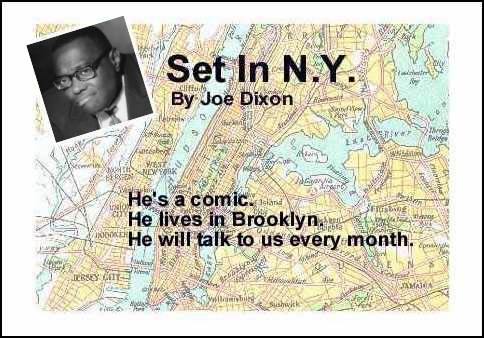
|
|
 | SHECKYmagazine.com HOME | BACK to the Columnist INDEX | JUL-AUG 2003 ISSUE |
|
JOE DIXON is a comic.
|
 |
|||
"2 Things I've Figured Out"by Joe Dixon 1. Age Matters He pointed at the young man, who looked about nineteen
but was probably in his mid-twenties. "If I was his age,"
the man said, "I'd already be in here." By "here"
he meant the comedy club we were both hanging out at. We were
sitting at the bar, each of us operating under the impression
that familiarity breeds stage time. The man was probably forty
something but I couldn't swear to that. We were just doing some
small talk when he leaned in and volunteered his assessment about
himself and the younger man. I didn't say anything. I really had
no idea if what he said was true. I didn't know enough about
his act and I didn't know the nineteen year old who was probably
in his mid-twenties at all. Still, even if he was wrong about
his own situation, he was right in the sense that if given a
choice between an older guy and a younger one, the powers that be
are going to lean toward the younger one more often than not. I mean, sure, maybe the dude in the comedy club was just
a bitter old fuck, but the very month this happened I heard a
report on NPR about TV producers who were not interested in hiring
sitcom writers above the age of 28. My first thought when I heard
this was, "Who the fuck cares about how old the writer is?"
But when I mentioned this to a TV and screenplay writer who teaches
over at NYU, he explained to me that what producers want are people
close in age to the people advertisers seek, 18-24 year olds.
By the time you hit your 30's, you're expected to be producing
shows. At first, this made no sense. Just turn on the TV. Every
other sitcom is about a guy with a house, a car, a wife and a kid.
How can someone just barely out of college tell a story about
mortgage payments, day care centers and maintaining a marriage
while working longer hours for a salary that hasn't increased
in years? Well, they probably can‘t. But if you look at the average
situation comedy closely, you'll see that they don't have to.
Most sitcom families have nothing to do with actual families.
This will explain how characters can have very small children
but seldom be seen actually raising them. This would certainly
explain how a program like, say, The Golden Girls could
have been on the air for several years and yet, in all that time,
all these post menopausal women could talk about was getting laid.
Not arthritis. Not financial insecurity. Getting laid. So, if TV producers are looking for that younger demographic
to write for their shows, it stands to reason that many clubs
are going to lean toward younger comics to get the producers to
come down to see shows. Which is why during the average comedy show
in New York you're twice as likely to hear newbies doing routines
about... well, getting laid, than telling jokes about alimony
payments. 2. The Audience Doesn't Matter Is it possible to bomb at a showcase and still get
representation? Is it conceivable to kill in front of a crowd
and not have anyone look at you twice? The answer to both
of these is, of course, yes! If a manager or an agent or whatever
gets it into his head that you're funny, then it doesn't
matter if you bomb somewhere, they're still going to think
you're funny. Why? Because, they find you funny.
What you'll hear is that they "know funny" when they
see it. But the truth is, this isn't math where the answer to
2 plus 2 is always four. One perfectly funny person can be a
super success and the other equally or maybe even more funny
person can barely be known outside standup comedy circles.
In that type of world, people are going to go with their own
personal preferences because nothing else is so easily known. But how is it that you can kill in front a crowd and not
get any respect? How is it possible to get tons of laughs
and not rise very far in the ranks? That’s simple. For the same
reason someone can get few laughs and be considered a genius,
you can get tons of laughs and be considered lame. You see,
if enough of your peers think the type of standup you do is not
the "right" type of standup, then you suck, no matter
how funny you are. What’s the "right" type of comedy
beyond being funny? Well, if you poll the average audience member,
they won't know or care but, remember, they don't matter.
Indeed, if you ask most comics (Well, most comics in this town,
anyway.) they'll happily tell you that they consider the vast
majority of Americans to be morons. After all, the argument goes,
they didn't appreciate Bill Hicks but made Carrot Top a millionaire.
Or maybe it's that they don't know Marc Maron but rush out to
see the latest Adam Sandler movie. Something along those lines.
The point is, the audience simply doesn't matter. What matters
is the clique you find yourself in. Once you are in a clique
then you'll discover that everyone who is not in your clique
is performing the "wrong" kind of comedy. Roadies can
hate city guys. Alternatives can denounce people with punch lines.
Ranters can despise guitar acts, etc. If you have a hard time grasping this concept then just
think back to high school and you should get the idea.
|
|
|
 |
SHECKYmagazine.com HOME | Back to the Top |
|
|